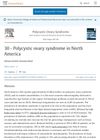 2 citations,
July 2023 in “Frontiers in Endocrinology”
2 citations,
July 2023 in “Frontiers in Endocrinology” The review found that current care models for PCOS are not fully effective and more research is needed, especially in low-income countries.
4 citations,
April 2018 in “Fertility and sterility” PCOS significantly affects women's mental health, and more research is needed to develop effective treatments for these issues.
 1 citations,
November 2023 in “Reproductive biology and endocrinology”
1 citations,
November 2023 in “Reproductive biology and endocrinology” Most women with PCOS have insulin resistance, especially those with phenotype B.
 91 citations,
April 2017 in “Diabetes & Metabolic Syndrome: Clinical Research and Reviews”
91 citations,
April 2017 in “Diabetes & Metabolic Syndrome: Clinical Research and Reviews” Eating fewer calories, less sugar and refined carbs, and more low-glycemic and omega-3 rich foods can help manage PCOS symptoms.
 9 citations,
January 2022 in “Reproductive Biology and Endocrinology”
9 citations,
January 2022 in “Reproductive Biology and Endocrinology” High levels of male hormones and irregular periods best predict how well PCOS patients will respond to metformin treatment.
 May 2023 in “Journal of Student Research”
May 2023 in “Journal of Student Research” Creating specific biological indicators is important for early detection and treatment of PCOS.

Women with Polycystic Ovary Syndrome (PCOS) have a lower health-related quality of life, especially those with an anovulatory phenotype, and need specific interventions to improve it.
 January 2019 in “Open Access Journal of Nursing”
January 2019 in “Open Access Journal of Nursing” Thai women with PCOS become more aware and change their lifestyle to manage their fertility and symptoms.
 9 citations,
December 2013 in “International journal of gynaecology and obstetrics”
9 citations,
December 2013 in “International journal of gynaecology and obstetrics” Polycystic ovary syndrome (PCOS) is a major health issue for women in Egypt, affecting 14% of fertile women and 37.5% of infertile women.
 April 2023 in “Elsevier eBooks”
April 2023 in “Elsevier eBooks” PCOS is a common and costly condition in North American women, causing various health issues like obesity, diabetes, and fertility problems.
 April 2020 in “Research Square (Research Square)”
April 2020 in “Research Square (Research Square)” Women with PCOS may have a reduced ability to fight breast tumor cells over time.
 July 2023 in “Journal of Controversies in Obstetrics & Gynecology and Pediatrics”
July 2023 in “Journal of Controversies in Obstetrics & Gynecology and Pediatrics” Polycystic ovary syndrome is a common hormonal disorder in women that affects health and fertility.
 2 citations,
February 2022 in “Frontiers in Endocrinology”
2 citations,
February 2022 in “Frontiers in Endocrinology” Antiandrogenic pretreatment for women with PCOS does not improve fertility outcomes and delays pregnancy.
 10 citations,
April 2018 in “Maturitas”
10 citations,
April 2018 in “Maturitas” Excess male hormones in postmenopausal women can cause health issues and increase the risk of heart disease and diabetes; treatment depends on the cause.
 27 citations,
March 2018 in “Fertility and Sterility”
27 citations,
March 2018 in “Fertility and Sterility” Women with PCOS who had antiandrogenic treatment before pregnancy had fewer complications than those without treatment.
 December 2022 in “International Journal of Current Science Research and Review”
December 2022 in “International Journal of Current Science Research and Review” Polycystic Ovary Syndrome (PCOS) is a common but often undiagnosed disorder in women that can cause irregular periods, infertility, and other symptoms, and can be managed with lifestyle changes, medication, and sometimes surgery.
 1 citations,
May 2022 in “Research Square (Research Square)”
1 citations,
May 2022 in “Research Square (Research Square)” Acetate helps reduce depression in rats with PCOS by lowering specific gene expression and DNA changes in the brain.
 4 citations,
January 2022 in “Open Health”
4 citations,
January 2022 in “Open Health” Eating healthy, exercising, and changing behaviors are the best first steps to treat Polycystic Ovary Syndrome (PCOS).
 1 citations,
October 2012 in “Gynäkologische Endokrinologie”
1 citations,
October 2012 in “Gynäkologische Endokrinologie” The document concludes that proper diagnosis and individualized treatment are crucial for managing androgenization in women effectively.
8 citations,
September 2005 in “Practical diabetes” PCOS is a condition causing irregular periods, excess male hormones, and infertility, often managed by targeting insulin resistance and specific symptoms.
 5 citations,
October 2016 in “European Journal of Obstetrics & Gynecology and Reproductive Biology”
5 citations,
October 2016 in “European Journal of Obstetrics & Gynecology and Reproductive Biology” Women with PCOS may have a higher risk of respiratory and ear infections due to slower nasal mucociliary clearance.
 74 citations,
July 2010 in “The Journal of Clinical Endocrinology & Metabolism”
74 citations,
July 2010 in “The Journal of Clinical Endocrinology & Metabolism” Treatment of acromegaly can improve women's reproductive health issues caused by hormonal imbalances or tumors.
 November 2023 in “Curēus”
November 2023 in “Curēus” Eating junk food is linked to higher rates of PCOS and related symptoms in women.
 September 2022 in “Journal of Contemporary medical practice”
September 2022 in “Journal of Contemporary medical practice” Most women with Polycystic Ovarian Disease have trouble getting pregnant due to hormonal imbalances, but lifestyle changes and certain drugs can help.
 9 citations,
March 2022 in “Frontiers in Endocrinology”
9 citations,
March 2022 in “Frontiers in Endocrinology” About 19.4% of Iranian women in the study have Polycystic Ovary Syndrome, with the most common type involving irregular periods and high male hormone levels, but their heart and metabolic health is similar to women without the condition.
 August 2023 in “MOJ women's health”
August 2023 in “MOJ women's health” Brown Adipose Tissue (BAT) could potentially treat Polycystic Ovary Syndrome (PCOS) by controlling energy balance and lipid homeostasis, but more human research is needed.
 3 citations,
March 2007 in “Canadian Medical Association Journal”
3 citations,
March 2007 in “Canadian Medical Association Journal” Women with PCOS should have an oral glucose tolerance test for effective diabetes screening.
 January 2022 in “Journal of family medicine”
January 2022 in “Journal of family medicine” Polycystic Ovarian Syndrome (PCOS) can cause chronic inflammation, mental health issues, and changes in gut bacteria, but a holistic lifestyle change can significantly improve these conditions.

Many women with PCOS in Saudi Arabia suffer from depression and anxiety.
 883 citations,
August 2016 in “Nature Reviews Disease Primers”
883 citations,
August 2016 in “Nature Reviews Disease Primers” Polycystic Ovary Syndrome (PCOS) is a common condition in women that can cause metabolic, reproductive, and psychological issues, and requires lifestyle changes and medication for management.



























